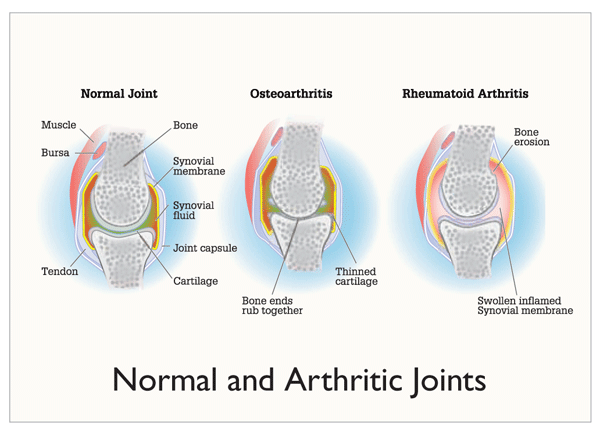Let's talk more about OA
I talked briefly about arthritis a few weeks ago, and I described the difference between OA, or osteoarthritis, and RA, rheumatoid arthritis. I told you that arthritis is either degenerative or inflammatory in nature. OA is degenerative, and RA is the inflammatory one. So let's talk about these degenerative changes and see what we can learn today.
Look at all the changes from the healthy side on the left to the arthritic side on the right.
Arthritis is a nasty condition. Unchecked inflammation can lead to the destruction of almost any joint. That's one of the reasons that chiropractic care is so important. We keep joints mobile. Movement is one of the greatest anti-inflammatory agents that we know. Nearly every single blog that you read and every doctor's recommendation for patient's with arthritis will be low-impact cardio and weights. Why is that? Won't these joints hurt more if you move them? The short answer is no. The body will adapt as well as it can and will keep you from hurting as much as possible. Now, if you have virtually no cartilage left in your knee, as is almost the case for the illustration above on the right side, then perhaps training for a marathon isn't the best form of exercise for you. But, you could likely still use an elliptical, any type of stationary bike, and do aquatic-based exercise. You might even be able to get away with playing clay-court or grass tennis.
What body parts does osteoarthritis like to affect?
Well, that's a good question. Osteoarthritis can affect any joint in the body, but it tends to like larger joints. Rheumatoid arthritis, on the other hand, tends to like smaller joints. The exception to this is that osteoarthritis loves the spine, which is not typically considered a large joint. I will give you a lot more information about arthritis in the spine in a future blog post, don't worry.
Compare normal with the two major types of arthritis demonstrated here.
When should I consider more aggressive treatment than diet and exercise?
I have been asked this by several patients dealing with osteoarthritis in hips, knees and shoulders. There is no one size fits all answer. Another name for osteoarthritis is degenerative joint disease, and that probably gives a better indication. Common treatments include chiropractic of course, acupuncture, NSAIDs (non-steroidal anti-inflammatory drugs), narcotics, cortisone injections, and eventually joint replacement.
The best answer is that you need to listen to your body. The stronger the treatment option that you decide to go with, the greater the risks. Cortisone shots are very good for relieving pain, but they don't last forever. In fact, they become less effective the more that you use them. That said, they should really be reserved until you have to use them, or else you run the risk of using them to dull pain at a 6/10 and then having pain later that's an 8/10 that cannot be helped. Joint replacement surgeries, which can replace partial amounts of the joint or the total joint, have improved so much of the last few years. The new joints are terrific, and there is a good chance that you can have a nearly normal life with a new joint. However, the surgeries are not always a complete success, there can be side effects like pain, popping, clicking and the like that never abate. Finally, these replacement joints have a shorter lifespan than your natural joints and often need to be replaced somewhere around the 10 to 20 year mark after the initial procedure is complete. If you are already an elderly patient, this may not be a big concern. However, if you're under fifty, you will probably need to get at least one more replacement in your lifetime.
Remind me about diet and exercise that I should be doing again?
Well, you're in luck, I just covered that pretty extensively in my very last blog post called "Let's Talk More about RA," which was published on July 28. You know I'm a sucker for infographics though, so I'm going to leave you with some helpful anti-inflammatory food lists that I originally posted in the previous article.
There are many other lists, make sure you look up anti-inflammatory foods and avoid processed foods whenever possible.




